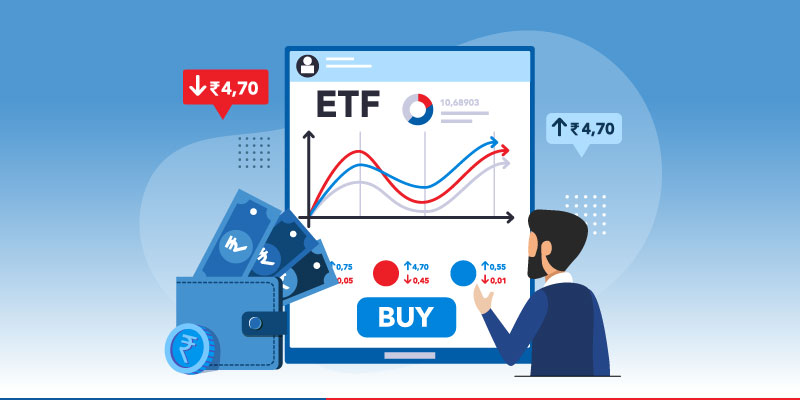What do you want to do?
ETFs and what must you know about them

Table of Content
Understanding ETF
ETF is an 'exchange traded fund' that you buy or sell through a brokerage firm on a stock exchange. ETFs are offered on all asset classes, including investments and commodities. Innovative ETF structures allow investors to short markets, to gain leverage, and to avoid short-term capital gains taxes.
Types of ETFs
Market ETFs:
These are designed to track a specific index like a S&P 500 or NASDAQCommodity ETFs:
These are designed to track commodities like gold, oil, etc.Bond ETFs:
These are designed to track an investment style or market capitalization focus, such as large-cap value or small-cap growthInverse ETFs:
These are designed to profit from an underlying market or indexForeign ETFs:
These are designed to track non-U. S markets like Japan Hong KongStyle ETFs:
These are designed to track an investment style or market capitalization focus, such as large-cap value or small-cap growthAlternative investment ETFs:
These are ETFs that allow investors to trade volatility or gain exposure to a particular investment strategy, such as currency carry or covered call writing
How ETFs work
ETFs are bought and sold like company stock during the day when the stock exchanges are open. Like in the case of stocks, ETFs also have intraday price data that can be obtained during the day.
But unlike a company stock, the number of shares outstanding of an ETF can change every day due to the continuous creation of new shares and the redemption of existing shares. The ability of an ETF to issue and redeem shares on an ongoing basis keeps the market price of ETFs in line with their underlying securities.
ETFs have a high appeal to investors since you can do intraday trading. There is no sales low, however, broker commissions are applicable. It also gives investors a better control over when to pay their capital gain tax.
Strategies for ETFs
Once you have determined your investment goals, you can invest your assets in a conventional fashion using stock index and bond ETFs, and adjust the allocation in accordance with changes in your risk tolerance and goals. You can also choose to add alternative assets, such as gold, commodities, or emerging stock markets. You also have the option of moving in and out of markets quickly, hoping to catch shorter term swings, much like in case of a hedge fund.
For more details visit HDFC Life (www.hdfclife.com) which has term insurance plans best suited for your needs.
 Term Plan Articles
Term Plan Articles
 Investment Articles
Investment Articles
 Savings Articles
Savings Articles
 Life Insurance Articles
Life Insurance Articles
 Tax Articles
Tax Articles
 Retirement Articles
Retirement Articles
 ULIP Articles
ULIP Articles
Subscribe to get the latest articles directly in your inbox
 Health Plans Articles
Health Plans Articles
 Child Plans Articles
Child Plans Articles
 Popular Calculators
Popular Calculators
 Insurance Advisor Articles
Insurance Advisor Articles
Here's all you should know about life insurance.
We help you to make informed insurance decisions for a lifetime.
HDFC Life
Reviewed by Life Insurance Experts
HDFC LIFE IS A TRUSTED LIFE INSURANCE PARTNER
We at HDFC Life are committed to offer innovative products and services that enable individuals live a ‘Life of Pride’. For over two decades we have been providing life insurance plans - protection, pension, savings, investment, annuity and health.

Popular Searches
- Term Insurance Calculator
- Investment Plans
- Investment Calculator
- Investment for Beginners
- Best Short Term Investments
- Best Long Term Investments
- 5 year Investment Plan
- savings plan
- ulip plan
- retirement plans
- health plans
- child insurance plans
- group insurance plans
- income tax calculator
- bmi calculator
- compound interest calculator
- income tax slab
- Income Tax Return
- what is term insurance
- Ulip vs SIP
- tax planning for salaried employees
- HRA Calculator
- Annuity From NPS
- Retirement Calculator
- Pension Calculator
- nps vs ppf
- short term investment plans
- safest investment options
- one time investment plans
- types of investments
- best investment options
- best investment options in India
- Term Insurance for Housewife
- Money Back Policy
- 1 Crore Term Insurance
- life Insurance policy
- NPS Calculator
- Savings Calculator
- life Insurance
- Gratuity Calculator
- Zero Cost Term Insurance
- critical illness insurance
- itc claim
- deductions under 80C
- section 80d
- Whole Life Insurance
- benefits of term insurance
- types of life insurance
- types of term insurance
- Benefits of Life Insurance
- Endowment Policy
- Term Insurance for NRI
- Term Insurance for Women
- Term Insurance for Self Employed
- Benefits of Health Insurance
- Health Insurance for Senior Citizens
- Health Insurance for NRI
- Best Term Insurance Plan for 1 Crore
- personal accident insurance
- Annuity Calculator
- Life Insurance Calculator
- Term Insurance Comparison
- Digital Life Insurance
- Child Education Planner
- GST on Term Insurance
- Term insurance for Diabetics
- Term Insurance for Doctors
- Term Insurance for Overweight
- Term Insurance for Below Poverty Line

